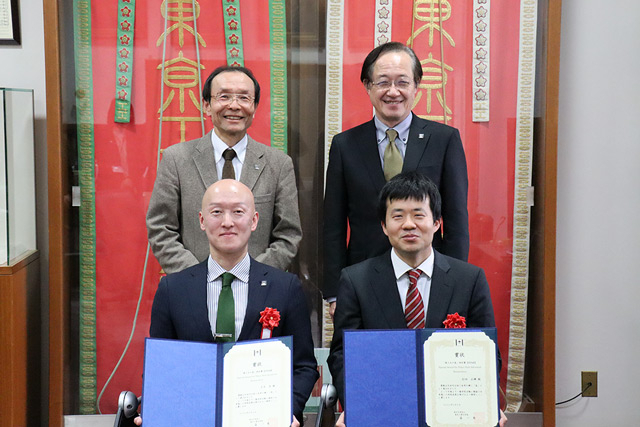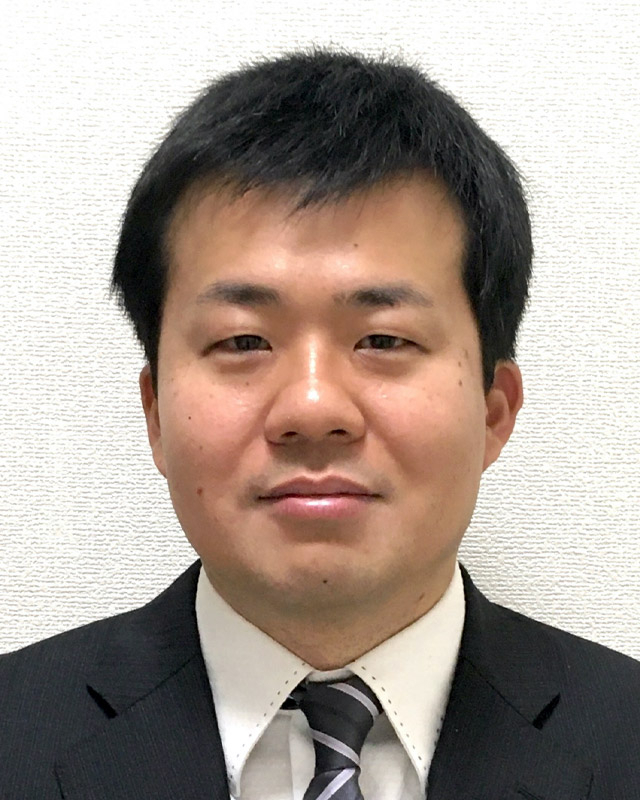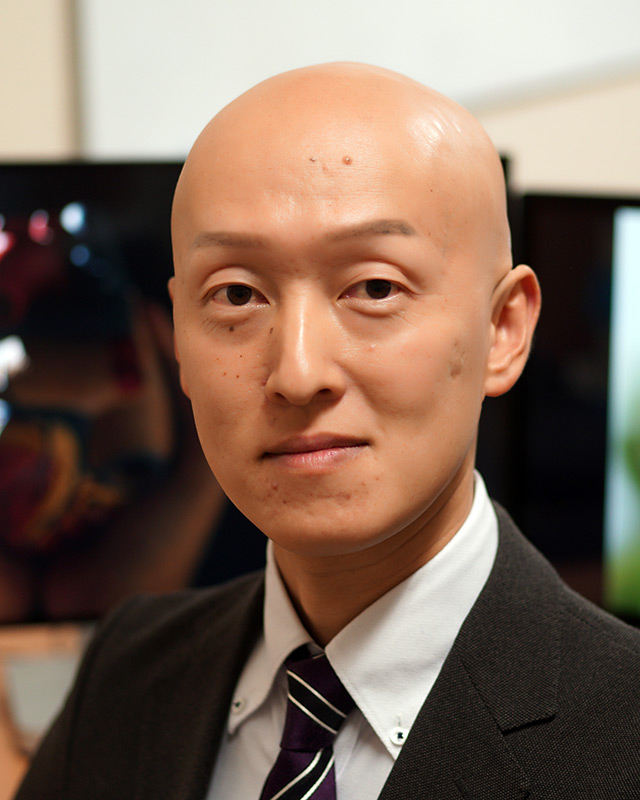Associate Professor Masaki Uchida of the Department of Physics, School of Science, and Associate Professor Wataru Hijikata of the Department of Mechanical Engineering, School of Engineering, have been selected for the Special Award for Tokyo Tech Advanced Researchers (STAR) in FY2023. For this 11th call, two "STARS" were selected after consultation with the President and the Director of the Office of Research and Innovation.

Front from left: Associate Professor Wataru Hijikata and Associate Professor Masaki Uchida Back from left: Executive Vice President for Research Osamu Watanabe and President Kazuya Masu
The STAR grant, supported by the Tokyo Tech Fund, is awarded each year to promising young researchers who grapple with research topics that have the potential to become national projects in the future. Other recipients may include those who have achieved distinguished results in the fundamental sciences. Tokyo Tech's STAR grant aims to support rising stars among the next generation of researchers.
Research Overviews and Researcher Comments
Associate Professor Masaki Uchida, the Department of Physics, School of Science
Research Overview: Exploration of anomalous magnetotransport phenomena in topological semimetals

Band structures are used to describe electrons in materials quantum-mechanically. Recently a new class of materials called topological materials, which focuses on the topological properties of electronic bands, has gained traction in research. Among topological materials, those known as topological semimetals, with a band gap closed at one point, have been discovered to have a low-energy band structure, a concept first proposed in particle physics. Topological semimetals were fabricated into very thin films of high quality using a technique known as molecular beam epitaxy, and the electron conduction phenomena are being studied. In this study, we hope to look into unusual conduction phenomena that arise from this point and connect them to future electronics applications.
Researcher Comment
I am very honored to be selected as a recipient of the STAR grant. I would like to express my sincere gratitude to all the donors of the Tokyo Tech Fund and the selection committee members. I would also like to take this opportunity to express my gratitude to my supervisors, collaborators, and laboratory members for their efforts. With such large-scale support, unparalleled by any provided by a university, I would like to further pursue my research.
Associate Professor Wataru Hijikata, the Department of Mechanical Engineering, the School of Engineering
Research Overview: Study on a ventricular assist device and engineering application of biological tissues intended for human-machine integration

Age life expectancy of the human population has increased significantly over the past 200 years. However, healthy life expectancy, which is defined as the period during which people can live without being restricted by health problems, is shorter than the average life expectancy, with a gap of about 10 years in Japan. From this perspective, I believe that there is a need to develop science and medical technology that will lay the groundwork for people to lead richer lives, not only by extending average life expectancy but also by extending healthy life expectancy and improving quality of life. My research focuses on ventricular assist devices used in the treatment of patients with severe heart failure, with the goal of integrating humans and machines to realize medical technology that enables people to live like healthy people even in the event of illness. Since conventional ventricular assist devices generate a continuous flow at a fixed motor speed, the flow rate cannot be increased or decreased in response to the patient's exercise condition, and the risk of thrombosis increases due to the loss of the pulsatile flow. Hence, I am developing a ventricular assist device that can control heartbeat synchronization based on the timing of the heartbeat by using electromagnets used in the ventricular assist device to estimate the diseased heart's beating in real-time. As another approach to human-machine integration, I aim to create novel medical and welfare devices such as power-assistive suits that can repair themselves in the future by utilizing biological tissues such as skeletal muscles. In particular, I am now developing technologies for the design and control of biological tissues using engineering methods.
Researcher Comment
I am very honored to have been selected for the Special Award for Tokyo Tech Advanced Researchers [STAR] program. I would like to express my sincere gratitude to all the contributors and selection committee members of the Tokyo Tech Fund. This research cannot be done by me alone. I would also like to take this opportunity to thank my collaborators and laboratory members. With this support, I will continue to promote challenging research.
About the STAR grant
Purpose
Funded by the Tokyo Tech Fund, this program aims to provide large-scale support to bright young researchers who create new value based on various unique research achievements in the fundamental sciences. This objective is in line with the Institutes mid-term goals and contributes to enhancing research capacity.
Selection process
Based on their career and research achievements, recipients are selected by the president and the head of the Office of Research and Innovation. Individuals cannot apply for this award.
Selection criteria
-
Young researchers engaged in a project which contributes to strategic policies on the national level
-
Young researchers who demonstrated outstanding achievement in basic research Eligibility Early-career researchers with a title of associate professor or below (in principle under the age of 40)
Related
. Any information published on this site will be valid in relation to Science Tokyo.








